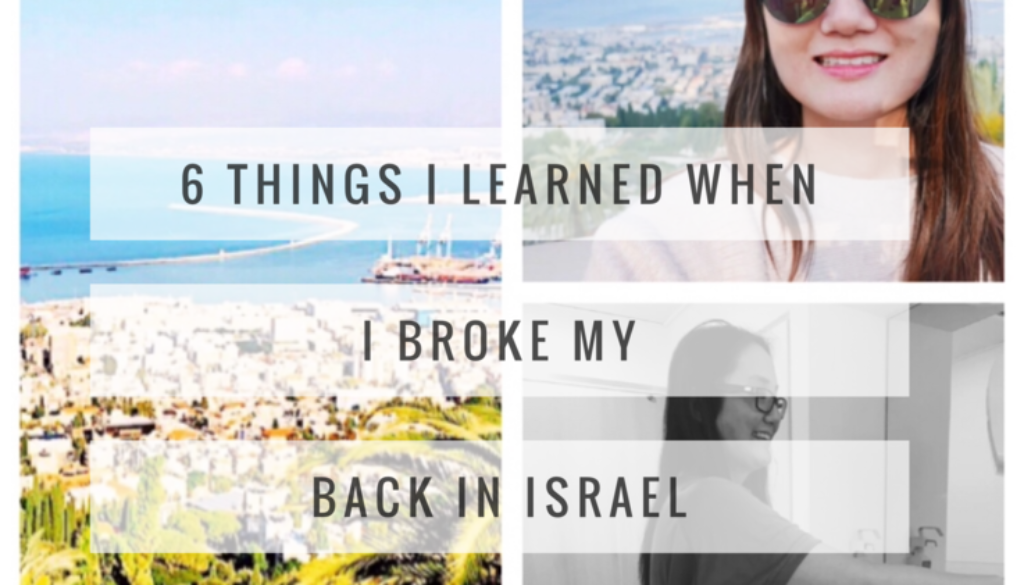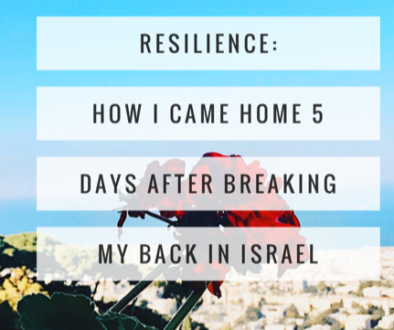I broke my back in Israel several weeks ago. When we plan for holidays we often focus on flights, accommodation and things to do. Often, we don’t think about medical assistance for emergencies. This is my personal story and what I have learned from this nightmare experience.
The Accident
When I felt the hard thud of my back hit the concrete beneath me it was too late. I had fallen very awkwardly. My legs suddenly felt weak. I was dizzy and gasping from the impact as each breath triggered more pain internally. Lying on the ground in agony, I looked up at the faces that circled above me offering help.
“I’m okay, I’m okay, I can walk it off” I muttered repeatedly. Instinctively I was washed with embarrassment, but it was more complex than that.
It was one of those rare moments when you realise you are that tourist that is making a spectacle and you can’t easily move away from the attention.
That morning I had strolled from the Dizengoff Center to the Tel Aviv promenade. Later I had planned to try the famous sabich, a pita stuffed with fried eggplant that the local students had highly recommended.
I worked hard to earn one of three spots allocated for Australian MBA students to study in Israel. I had already finished a fascinating year in my new role at work and relocated between Sydney and Brisbane. Up until this point I’d successfully travelled to many countries alone. In this instance, a crushing fear set in that I would lose everything and become immobile and irrelevant.
I knew I could not lie there hoping to disappear. I was very far from home, repatriation would be too costly, I had to get up. My limbs were numb but usable. So, after a few attempts of rolling over, I was cautiously helped onto a bench.
The Hospital
My MBA coordinator rushed to see me. We went to an emergency clinic first, where I was assessed and admitted to hospital.
The next few hours were harrowing. My accident happened on a Friday, a few hours before Shabbat the Jewish day of rest, so I later learnt that the specialists required for my specific injuries were not available until Sunday. The emergency room was urban, noisy and crowded with patients lined along the corridors on any available chairs waiting for medical attention. I remember the dimly lit corridors and the shades of off green uniforms rushing from one curtain to another.
Since I was still relatively conscious, the triage system did not work in my favour. Equally puzzled, I lay there watching patients down burgers or take hospital selfies while I was in dire need of medical assistance. My mistake, I was too calm at triage.
Above all else, I felt terrible for my MBA coordinator who spent her Friday night calling the university, pacing up and down requesting for a doctor and humouring me with continuous conversation to distract me from the pain. This was way beyond her job but she never left me. At some point after my first CT I saw the medical staff’s expression change from indifference to genuine concern. I was asked to refrain from moving. I was swiftly rolled into different rooms for tests. It was then that everyone finally took it seriously. Nevertheless, it was thirteen hours from my initial accident before I was given my first dose of morphine.
Going Home
I had a burst fracture and was in neuro for 4 days before flying back to Sydney via business class (20 hours TLV-HK-SYD) to be admitted to the Royal North Shore Hospital. The medical staff had prevented any further compression to my spine and I am grateful for the professionalism and medical care in Israel.
Spending a lot of time in hospital, I have come to terms with the accident and how lucky I am to escape with minimal impact. The accident amplified a lot of decision errors I made on the day and re-set many priorities for me. The process of re-learning to walk with the fracture or reprogramming simple tasks I previously took for granted like taking a shower independently has been truly a humbling experience.
If you’re wondering how I am doing now, I am well.
I hope to return to Israel one day to thank the people who helped me get home and to also finally try that sabich…timing really is everything.
These are some of the lessons from Israel that resonated with me. I hope it will be helpful to you:
Lesson 1 Research your travel insurance options
The medical fees were exorbitant, I was horrified at the zeros on the hospital bill. I never prioritised travel insurance before, so I was lucky that it was included with my credit card. Nevertheless, my experience with the insurance company was more stressful than my injury. The company had no access to Hebrew translators. The paperwork required was also horrendous. Research your travel insurance options before travelling abroad.
Lesson 2 Find a tourism medical officer
I got by on English and a few single words of Hebrew. On my third day, I discovered that the hospital had tourism medical officers. The medical officer explained the hospital discharge process and translated my concerns around flying home. More importantly, she helped me obtain the necessary paperwork in Hebrew and English required by the airport and insurance company (see Lesson 1 and 3).
Lesson 3 Try not to travel through Ben Gurion Airport unless your pain management is under control
Unless it is necessary, try not to attempt flying home until you have adequate pain management. Ben Gurion airport is infamous for its notorious security interrogations for departing passengers. I arrived at the airport four and a half hours early accompanied by MBA students from HKUST.
The process is in three parts: security questioning then airline check in and then luggage checks. This meticulous process is to protect all passengers and the queues take hours regardless of business or economy. There were no wheelchairs available until an hour and half into the process. By the time I had completed security questioning, I was in immense pain. Despite obvious mobility issues, I had to prove to authorities that I had an injury. I still had to remove my back brace and walk through a security scanner.
Once pass the security barriers, I kept my game face on, I was fearful the airline would deem me a flight risk and refuse to let me travel home. As the plane lifted out of Tel Aviv, my spine was in agony, the physical exertion from navigating the airport had taken its toll.
Lesson 4 Medical assistance can be challenging during Shabbat
Tel Aviv is much more secular than Jerusalem however a few hours before and during Shabbat many services including restaurants, taxis and medical care are hard to come by. Shabbat begins on Friday sundown and ends at nightfall the next day.
Lesson 5 People care about you
I travelled to Israel alone but I was surrounded by caring people during the whole ordeal. I was blown away by the compassion and kindness of the people around me that were strangers before.
My MBA coordinator, who is truly remarkable, attended the hospital every day for hours. I experienced so much with her. My selfish accident took a lot of time from her work. My hospital bed neighbour offered support in the form of phone charger, coffee and humorous conversation. The kindness of MBA students that reached out and accompanied me through the airport was uplifting.
I truly believe my life is in two parts now: before and after Israel. The accident taught me a lot about empathy, human connection, and our positive actions towards others. The generosity of the people that helped me was unconditional and I will forever be grateful to them.
Lesson 6 Embrace chutzpah
In business school, many lecturers pointed to chutzpah as an attitude that propels innovation in Israel. In hospital, the medical staff speak many different languages and you are expected to ask sharp direct questions. I found the casual but blunt communication style a refreshing contrast from the indirect bedside manner in Australia, no strange avoidance of eye contact – just straight answers with good and bad news. Use chutzpah respectfully, albeit unapologetically, to participate in your medical care.

